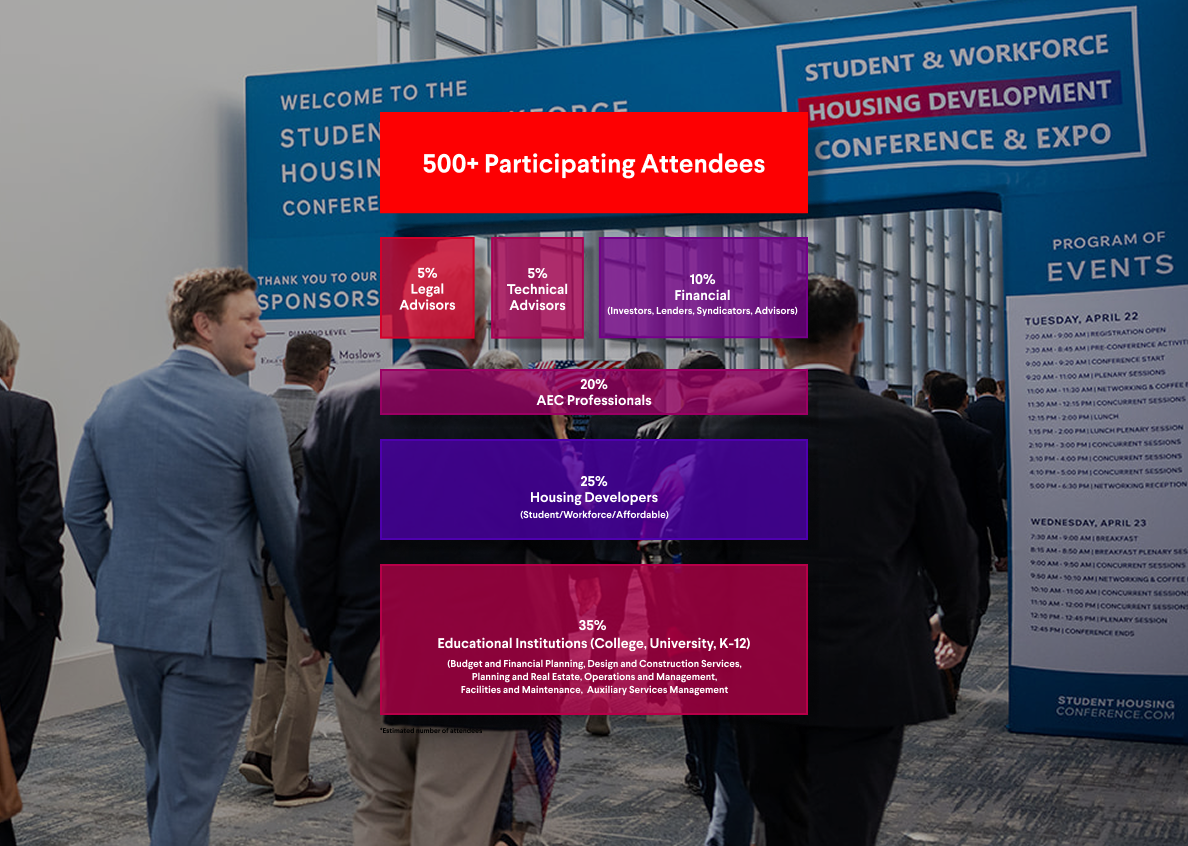-
WHO ATTENDS?
Our diverse group of attendees includes professionals from educational institutions (college, university, K-12) and the private sector, creating a dynamic community of housing and facilities leaders, student/resident housing operations managers, budget and financial planning experts, real estate and development professionals, and public-private partnership specialists. They represent roles spanning on- and off-campus/district housing management, faculty/staff and workforce housing development, strategic planning, and auxiliary services. Attendees come together to network, exchange innovative ideas, and foster collaboration to advance housing solutions that support students/residents, staff, faculty, and the institutions they call home.
EDUCATION ADMINISTRATORS, CAMPUS PLANNERS, AND HOUSING & FACILITIES LEADERS FROM ACADEMIC INSTITUTIONS:
The logos displayed below reflect organizations associated with individuals who have registered for or participated in our event. Inclusion does not constitute endorsement or support by those organizations or any government agency. They are shown solely to indicate current and past attendance. To be added, removed or modifications, please contact us
INDUSTRY EXPERTS IN STUDENT AND WORKFORCE HOUSING DEVELOPMENT:
The logos displayed below reflect organizations associated with individuals who have registered for or participated in our event. Inclusion does not constitute endorsement or support by those organizations or any government agency. They are shown solely to indicate current and past attendance. To be added, removed or modifications, please contact us.
WHY DOES INDUSTRY ATTEND?
-
![]()
Networking
Cultivate relationships with the industry's most active development professionals.
-
![]()
Education
Discover innovative solutions and creative approaches to project delivery.
-
![]()
Business Development
Join a vibrant network dedicated to improving solutions for capital improvement projects.
-
![]()
Market Analysis
Uncover trends and actionable solutions for achieving local project success.
SPECIFIC MOTIVATIONS DRIVING THESE GROUPS:
EDUCATIONAL INSTITUTIONS
Budget and Financial Planning
Budget and Financial Planning
Financial planning professionals are motivated by the opportunity to understand trends in budgeting for housing and campus/district facilities. They look forward to gaining insights into funding models, such as public-private partnerships, and balancing cost management with quality service delivery in both higher education and K-12. The conference also serves as a platform for sharing best practices and challenges with other industry peers.
Design and Construction Services
Design and Construction Services
Professionals in Design and Construction Services attend the conference to explore innovative approaches to planning, designing, and executing campus/district housing projects. They are motivated to learn about sustainable design practices, efficient construction methodologies, and cutting-edge tools that enhance project delivery. By networking with architects, engineers, campus/district planners, and housing leaders, they gain insights to ensure projects are not only functional and cost-effective but also aligned with the needs of the campus/district community.
Housing Operations and Management
Housing Operations and Management
Professionals in housing operations and management attend the conference to learn best practices for optimizing housing operations and improving resident/student satisfaction. They are eager to explore innovative tools and technologies for streamlining housing assignments, leasing, and occupancy management, as well as strategies for tackling challenges like affordability, resident/student retention, and housing equity in both higher education and K-12. Networking with peers to exchange insights on trends in on-campus/district and off-campus/district housing is another key driver.
Housing Facilities and Maintenance
Housing Facilities and Maintenance
Facilities and maintenance leaders are motivated to discover cutting-edge practices and technologies to enhance housing sustainability, maintenance, and efficiency. They seek strategies for implementing cost-effective renovations and upgrades, along with case studies of successful housing projects in higher education or K-12. Connecting with vendors and solution providers for advanced facilities management tools is a key opportunity they look forward to.
Strategic Planning and Real Estate Development
Strategic Planning and Real Estate Development
Campus/district planners and real estate professionals attend to discover innovative approaches to campus/district development, including mixed-use projects and leveraging real estate assets for revenue generation. They seek insights into structuring public-private partnerships and managing long-term housing strategies for both higher education and K-12. Networking with developers, architects, and planners to build collaborations is a key motivation for this group.
Auxiliary Services Management
Auxiliary Services Management
Auxiliary services leaders participate to better understand how housing integrates with other campus services to enhance the student experience. They are interested in exploring opportunities for revenue growth, improving operational efficiency, and managing large-scale transitions or renovations. Networking with peers to exchange ideas on auxiliary services is also a key priority.
General Audience
Housing Developers
Housing Developers
Private and non-profit developers attend the conference to explore opportunities for collaboration on student, faculty, and workforce housing projects. They are motivated to learn about innovative public-private partnership models, financing mechanisms, and regulatory frameworks that drive successful development. Networking with campus administrators, planners, and financial professionals allows them to identify new projects and align their expertise with the housing needs of higher education institutions. Additionally, they gain valuable insights into market trends, sustainability practices, and strategies for delivering impactful and community-focused housing solutions.
AEC Professionals
AEC Professionals
AEC professionals attend the conference to engage with campus leaders and developers on the design and execution of student, faculty, and workforce housing projects. They are motivated to showcase innovative approaches to sustainable design, efficient engineering solutions, and cutting-edge construction practices tailored to the needs of higher education. By networking with housing administrators, real estate professionals, and planners, they gain insights into project goals, challenges, and trends that help them deliver impactful housing solutions aligned with institutional objectives.
Financial (Banking, Investors, Lenders, Tax Credit Specialists)
Financial (Banking, Investors, Lenders, Tax Credit Specialists)
Financial professionals attend the conference to explore investment opportunities in student, faculty, and workforce housing projects. They are motivated to learn about innovative financing models, such as tax credits, bonds, and public-private partnerships, that drive successful development. Networking with campus administrators, developers, and planners enables them to identify potential projects, assess market trends, and understand institutional financial needs. Additionally, they gain valuable insights into risk mitigation strategies and best practices for maximizing returns while supporting impactful housing initiatives.
Legal Advisors
Legal Advisors
Legal consultants attend the conference to provide expertise on regulatory compliance, contract negotiation, and risk management for student, faculty, and workforce housing projects. They are motivated to engage with campus administrators, developers, and financial professionals to address the legal complexities of public-private partnerships, tax credit structures, and real estate transactions. By participating in discussions on emerging regulations and best practices, they position themselves as essential partners in ensuring the successful and legally sound execution of housing initiatives.
Technical Advisors
Technical Advisors
Technical consultants attend the conference to offer expertise in specialized areas such as technology integration, sustainability, energy efficiency, and project management for housing and campus facilities. They are motivated to collaborate with campus leaders, developers, and AEC professionals to address complex challenges in project delivery and operations. By participating in discussions on innovative solutions, they gain insights into institutional needs and emerging trends, positioning themselves as valuable partners in delivering efficient, sustainable, and future-ready housing projects.















































































































































































































































































